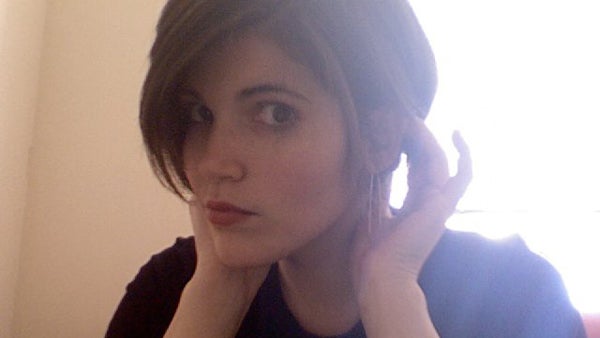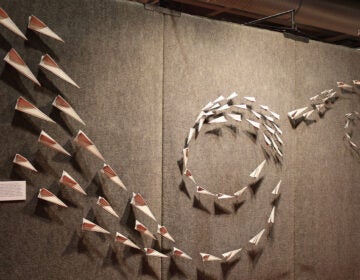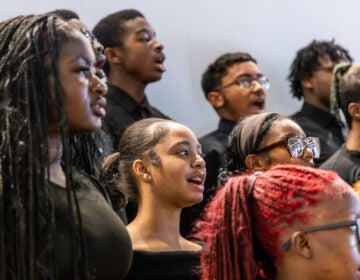7-year-old feminist gets into a fight, gets a lesson in girl power
Listen
(Image courtesy of Arielle Brousse.)
Each month, NewsWorks presents a story from the First Person Arts Podcast. In this edition, Philadelphian Arielle Brousse recalls the only time she’s been in a fight — as a 7-year-old feminist.
As part of a monthly series, NewsWorks presents this story from the August 20 edition of the First Person Arts Podcast. It was told at a story slam, where true-life stories are presented around a theme, no notes allowed. The theme that night was “girl power.”
Philadelphian Arielle Brousse recalls the only time she’s been in a fight — as a 7-year-old feminist. Listen to the story above. [Audio production by Kimberly Haas.]
I am Arielle, and I am a feminist.
I was set up for this. I was raised a feminist. And the problem with raising a girl as a feminist as an ethos — with training materials — is that I didn’t get the nuance that feminism is supposed to have. I didn’t get that I have a ton more power because I have lighter skin, because I had parents who could afford to clothe and shelter and feed me. I didn’t have a language for all of that.
What I did have a language for was: Boys get too much of a share of the pie, and they’re goin’ down.
I would be in class, and one of my teachers would be like: “You are one of the smartest girls I’ve ever taught.”
And I would be like: “Why am I not one of the smartest students you’ve ever taught? That’s sexist!”
And it was my entire life.
My mom would bring me when she volunteered at our local battered women’s shelter. My mom would do some counseling, and I would just kind of hang around and play with the kids, just be a friendly face around.
This one time I was there, and I was with a little girl who was just underfed and tiny. And she was wearing a t-shirt that was way too small and these corduroys that were way too big, and she looked like a little stick in a bag. It was just so clear that her parents didn’t have the time, when they were getting out of some sort of abusive situation, or the money to get clothes to fit this girl. And she was just living on scraps, any scrap of attention or love or material goods that she could get.
And I started playing with her, and she was so nice and she was so shy and so sweet once I got to talk to her.
And there was a boy there.
Now the boy was probably in the same situation. He was there because his mom was in a terrible situation and needed to be at the shelter, too. But he was acting out his situation way different from this girl. He was aggressive, and he was mean, and I just felt trouble from him, so I stayed away.
And me and this little girl, we’re playing with each other’s hair and doing each other’s fake makeup. And we’d found some highlighters, and we were doing each other’s nails. I was having so much fun. And this boy, I’m sure, felt left out.
He came up to us, especially to this little girl, who was smaller than me and more easily picked on, and said, “What, are you trying to make yourself look cute? You know you’re still ugly, and nobody likes you anyway.”
It was so much about, not just being ugly, but feeling unwanted in that moment that was twisting the knife in the worst situation she could be in. And he was just exercising his power over her. And I decided it was not going to stand.
I said, “Why is your head so big? Everyone knows you don’t have a brain in there, anyway.”
And there was a moment … and we both ran for it. I was slamming wastebaskets behind me so that he would trip over them. I was sliding on my hip under desks. And he was chasing me and chasing me, and he finally caught up to me. And he managed to plug down, with his knees, both my shoulders and my arms, and he is just wailing on me — probably 25 punches directly to the face.
And in this moment — I’m seven 7 old — I’m like: He’s not going to watch me cry. And I just take it with my eyes open.
They need three people to pull him off me. And they’re pulling me away from him. And I’m managing to lean into him and still keep my face like You didn’t hurt me. I swear to God, you will not see me cry.
Ten years, I was telling that story — like I was so cool not letting that guy see me cry. And the more I get older, the more I realize that not letting him see me cry had nothing to do with my power. My strength in that moment was sticking up for that little girl, was realizing how she was feeling and trying to be there for her.
My strength as an adult woman is to be in touch with all those emotions, not to have to repress my sadness and express it as anger. My strength is to know all those emotions, to know when I am hurting and to know why I am hurting — and to know to make that hurt right. To know to listen and to help make that hurt right for other people. And that I think is true woman power.
These days Arielle is much more imperturbable when she finds herself in outrageous situations. She attributes her level-headed response techniques to lessons her mother taught her, as she explained to us recently.
How did your mother react to the fight you describe in the story?
My mom is a pro in crisis mode. She never panicked or yelled, though she was one of the people who rushed to pull us apart. We went home as quickly as we could, but we had a long conversation about what had happened.
At the time, I was being raised with a Quaker-inspired moral outlook by my mom, who was in training to be a social worker. So we talked a lot about why that boy was scared and angry and felt the need to fight with me, and how she was proud that I stuck up for the little girl and chose not to hit the boy back just because I was hit first.
But she also showed me how my choice to insult him was, in a way, also a form of violence. She helped me brainstorm other ways that I could have resolved my problem with him. So a lot of my childhood problems — this one being the exception — were solved with talking at that time. (They still are. I’m a talker.)
Have there been other situations since, when you felt on the verge of fighting but backed down?
I’m a pretty nonconfrontational person, in general, so I have trouble coming up with situations where I wanted to really fight, in the visceral sense of the word. Usually I’m only angry enough to want to fight if someone has been messing with someone I’m close to; I’ve got a protective streak that doesn’t extend to self-preservation.
The closest I’ve ever come to a physical altercation was in a club on Halloween when a drunk guy kept coming up to me and my friends and grabbing their asses. I did actually shove him away when I told him to leave us alone. (I barely think that counts.)
The only other time I can think of is this: I lived alone for two years when I first graduated from college, renting a room in a Victorian cottage in West Philadelphia that had been converted into apartments. The landlord was a single older male, who I now realize (hindsight is always 20/20!) had a habit of renting out almost exclusively to young women.
He’d been inappropriate with me a few times — commenting on my appearance, looking in my windows with binoculars claiming to be “looking for squirrel nests” — but I took it in stride.
One day I found out he’d been in my apartment while I was at work, without giving me notice. I called him to tell him that what he’d done was not OK. He told me I was wrong, hung up on me, and then told me a few days later that due to “differences of opinion” he would not be renewing my lease. This was a month before my old lease expired: not a lot of time to move.
I was outraged. I wanted to hit him where it hurt; I wanted to scream at him, hurt him. I wanted to bleach his lawn, to register [Redacted Landlord Name]sucks.com and list it in every search engine available, to order 10,000 pizzas to be delivered to his apartment.
But I didn’t. I took a deep breath and remembered what my mom had taught me. I realized that doing any of those things to him wouldn’t make me any less angry about what he did. It would just make me an angry person who had also done some horrible things to another human being. So I held my head high, told him calmly but objectively how I felt he’d wronged me, avoided other conversation with him beyond the relevant move-out formalities, and left a toxic situation behind me.
I also work in West Philly, and I tell every single young woman I meet not to sign a lease with him, ever — and to pass on the recommendation.
Who is your favorite feminist hero/heroine (real-life or fictional) and why?
I have a ton of feminist heroes, ranging in domain from politics to pop culture. Janelle Monae is someone I’ve consistently been impressed with. When she started her music career, she had an image in mind that paid homage to her background — her race, her family’s history of careers in service — and refused to dilute or hypersexualize that image to conform to a music label’s standard. When she couldn’t find a label that wanted to back her, she launched her own. She knew that economic success that compromised her principles wouldn’t feel like a victory, and she wouldn’t go about it if it meant changing who she was.
When it comes to fictional characters, I don’t like someone completely tough as nails; that rings false to me. I like a hero that shows a real streak of vulnerability, because those occasional falterings are what make us human. That’s why Veronica Mars meant so much to me. She was smart, savvy, scrappy, funny — and she let herself cry when things got scary, let herself acknowledge when she was hurt. But she kept going, striking out for the truth at any cost.
It’s funny that I should talk about how much vulnerability means to me, since my current real-life feminist hero seems to be totally fearless. Malala Yousafzai is just steeled with conviction; I like to think I have principles, but I can’t imagine I could be shot in the head by a terrorist organization and still continue to speak out for those basic rights. She has a breathtaking, awesome kind of power. Her message is so clear, and so simple: Education matters. Girls can make a difference. And no, we won’t back down, no matter what you throw at us.
—
Arielle Brousse is a nonprofit fundraiser who knits, does yoga, drinks tea, and lives in Philadelphia with her fiancé and their two cats. She runs the blog The Sensible Nonsense Project, where she invites people to think about how their favorite children’s books continue to influence them.
WHYY is your source for fact-based, in-depth journalism and information. As a nonprofit organization, we rely on financial support from readers like you. Please give today.



